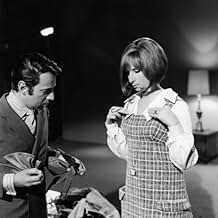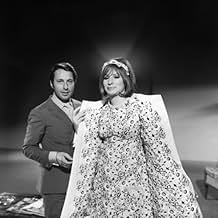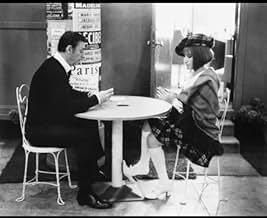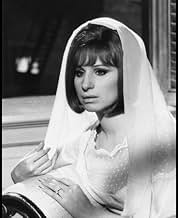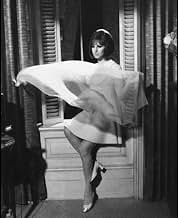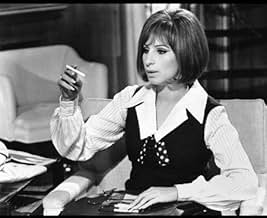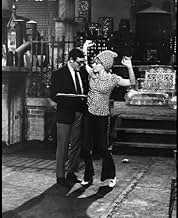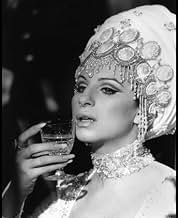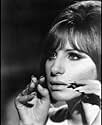Una joven con problemas, que consulta a un psicoterapeuta para que la ayude a dejar de fumar, se somete a hipnosis y se encuentra reviviendo una trágica aventura amorosa victoriana en una vi... Leer todoUna joven con problemas, que consulta a un psicoterapeuta para que la ayude a dejar de fumar, se somete a hipnosis y se encuentra reviviendo una trágica aventura amorosa victoriana en una vida pasada.Una joven con problemas, que consulta a un psicoterapeuta para que la ayude a dejar de fumar, se somete a hipnosis y se encuentra reviviendo una trágica aventura amorosa victoriana en una vida pasada.
Opiniones destacadas
My only qualification is a "drat it" regret that not all the songs were great. Half were well crafted, and the other half are poor-to-middling, with one having truly cringe-inducing lyrics. That's too bad; dropped the ball there. But the blockbuster songs are excellent. I'd always wanted to hear more Montand, and there he was giving the songs the timing and smooth delivery one expects from a great entertainer.
I can see why some folks think of this as a lesser period piece. But, like I said, I feel the writing lifts this out of the period and invites us to listen and watch with everything we have. And isn't that what art is supposed to do? Watch it.
However, comparing the stage version of this show with the film would be pointless, because all filmed musicals of Broadway shows usually change in more then a few ways. As for this film, it is a charming watch, and an enjoyable way to spend a couple of hours. You don't need to be fans of either of the lead actors, but it does help if you are a musical fan and are somewhat interested in the science of ESP.
The songs in this film are all great, not one of them are what I would consider "filler". A few of the original songs from the stage show have been replaced here with different pieces, but they are good ones nontheless. My only complaint in them is Yves Montand's singing. It's difficult enough to understand his spoken word, but it's even worst when he sings. John Cullum's singing in the original Broadway version is so clear and strong, and Montand is just not at par with that. Still, the quality of the songs themselves, make up for this. The Technicolor is stupendous, lusch and vivid. It's a shame that the film was cut so badly before it was released. Not having seen that version, it's difficult for me to say whether or not it would have been an improvement over the finished product, but I doubt it. As it is, this is a decent, pleasant musical film, and worth watching if you are a fan of the genre.
Streisand, after that stunning title montage (Love those blooming flowers and the clever lyrics that coax them into the sunshine!) is a bit grating in her opening scenes as Daisy Gamble, though she mellows somewhat as the modern-day plot progresses. However she more than rises to the occasion when Melinda is exhumed and she gets to parade about in Cecil Beaton's absolutely stunning accoutrements. Montand, who seems to have learned his lines phonetically (A foreign accent can be charming but he seems to be exaggerating his!), is serviceable, sings on key, and manfully wades through the machinations of the scriptwriters, what with the absurd brouhaha over reincarnation among the university's powers-that-be and Dr. Chabot's stubborn reluctance to admit that Daisy has psychic powers, et cetera. John de Cuir does his usual eye-filling wonders with the production design, beautifully aided by Harry Stradling, Sr.'s use of the Panavision/Technicolor cameras. And, of course, Burton Lane's score has a few liltingly listenable songs that propel the story quite felicitously. And there's the bonus of two of my favorite actresses, Mabel Albertson and Irene Handl, to add some sly support. (And, one must reluctantly mention Jack Nicholson, youthfully handsome in his brief appearance here, now a gothic ruin of his former self...Must be all those ill-tempered characters he's since played, as well as the reported off-screen dissipation in the decades since.)
But Nelson Riddle, undeniably one of the all-time great arrangers for singers like Frank Sinatra and Ella Fitzgerald, seems the wrong choice to orchestrate and conduct the musical elements. His work seems a little thin and not equal to the lush visual panoply. And, I suspect, Vincente Minnelli was hampered by the producer, Howard Koch, whose credits suggest a level of taste and achievement more oriented to audiences that preferred something less refined than what might have best suited this enterprise. The direction seems a bit diffuse, and even dispirited, and certainly not up to the standard of Minnelli's best in his halcyon days at Metro-Goldwyn-Mayer.
Nevertheless, I'll admit I enjoyed it when I saw it during its theatrical release, but beware of non-letterboxed video transfers. "Formatting" will reduce this one to considerably less than its makers intentions. If a DVD release comes along and you're a Streisand (or Minnelli) fan, it'll be worth the wait.
On A Clear Day started life as the next go-round for Richard Rodgers. After he retired working with Oscar Hammerstein, he partnered with Alan Lerner and they started to write this musical. Rodgers backed out of the project but the show made it to Broadway with Barbara Harris in the lead. It was respectfully received but never did blockbuster business. In fact, if it weren't for the song "What Did I Have?" it would almost be forgotten.
Enter Vincente Minelli and Ms. Streisand. Together, they took the idea and ran with it until it became a big, bright, lovely movie. The old songs (the title song and "What Did I Have") are rendered priceless by Barbra who sings them as emotional tour-de-forces. The new songs (a cute duet "Go To Sleep" and "Love With All The Trimmings") are wonderful. In fact, the latter was filmed a la Tom Jones. In short, everything about the film worked.
Originally it was three hours long and intended as a road show production (tickets ordered in advance; two shows a day). Paramount went for the fast buck and they trimmed it to under two hours. Yes, what is left is priceless and wonderful but I wish they would release the Director's Cut of this musical. If what we see today is still excellent, I can't help but wonder about what they took out.
It is a dinosaur.
Streisand was at her best in this film. Montand wasn't awful, just miscast. I recently watched some of his other movie performances, and was left with a question about the appeal that folks had in him to begin with. The music/songs were only brought to life by Streisand....who else could have held your interest in the lyrics? If this had been released before "Hello Dolly" it would have been a hit. Instead, it made Streisand look like a "one-trick-pony".
Director V.Minnelli was the right choice, in my opinion, and any adaption from stage to screen is always risky. Especially with a musical. No matter how you feel about this movie, try to imagine it without her. Who could pull it off? Your answers will thrill me.
I think, all in all, it was just made at the wrong time. When I watch it now, I feel very nostalgic about the past. Yeah! It was cool to have your bedding match your nightgown!
¿Sabías que…?
- TriviaAccording to the 1974 biography "Barbra Streisand: The First Decade", this was originally envisioned as a three-hour "road show" extravaganza, and included many sequences of Daisy's other lives (photos of which were printed in some pre-release promotions), but director Vincente Minnelli and the studio felt it would be too long, especially since musicals had already begun to fail at the box office. In addition to all but the briefest of Jack Nicholson's scenes being cut, a musical number sung by him and Streisand, "Who Is There Among Us Who Knows?," was also cut, as well as "Wait Till We're Sixty-Five," a duet between Larry Blyden and Barbra Streisand. Producer Howard W. Koch conducted a search for the deleted footage in 1994, particularly Nicholson's song, which he wanted to showcase during the AFI tribute to the actor. Nothing turned up at Paramount. Koch asked Streisand and Minnelli's widow if they had remnants of the cut footage, but neither did. Koch determined that if the film still exists, it's probably in a mislabelled canister.
- ErroresThe telephone ring in Chabot's office is not a typical Bell company ring, even though the story is supposedly set in New York.
- Citas
Dr. Marc Chabot: I used to be in love with answers, but since I've known you I'm just as astounded by questions. Answers make you wise, questions make you human.
- ConexionesFeatured in Paramount Presents (1974)
Selecciones populares
- How long is On a Clear Day You Can See Forever?Con tecnología de Alexa
Detalles
Taquilla
- Presupuesto
- USD 10,000,000 (estimado)
- Total en EE. UU. y Canadá
- USD 14,000,000
- Total a nivel mundial
- USD 14,000,000
Contribuir a esta página


